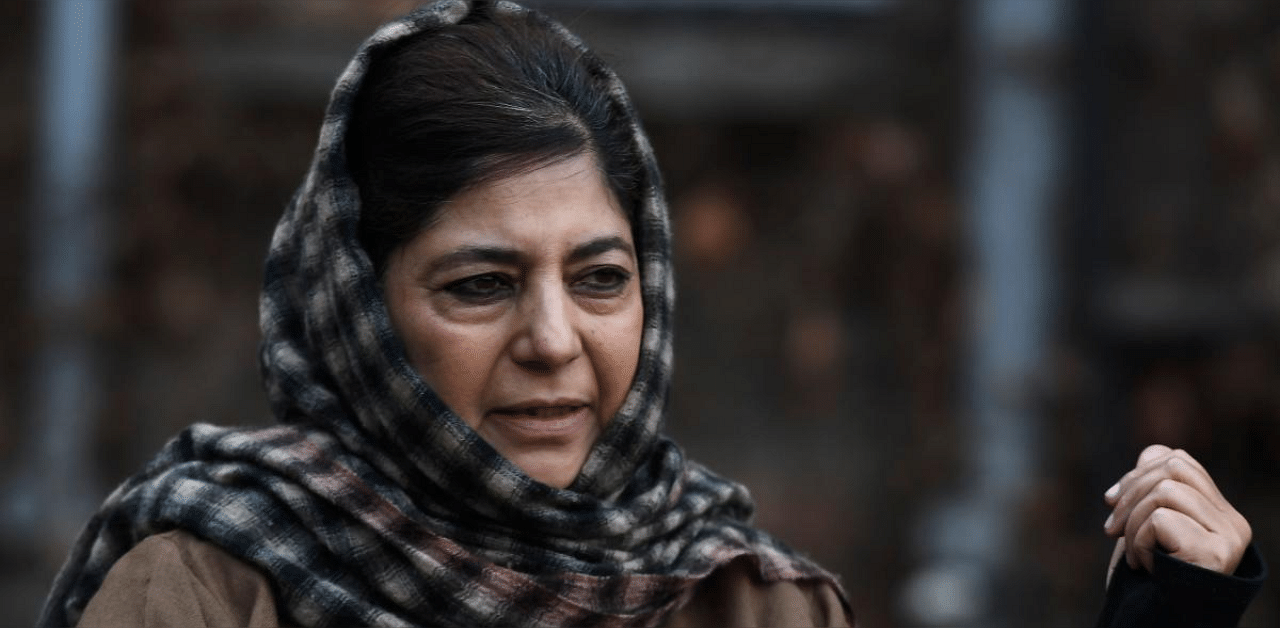
The Kashmir issue has neither been resolved with the scrapping of Article 370 nor can it be wished away, says former Jammu and Kashmir Chief Minister Mehbooba Mufti. She tells DH’s Zulfikar Majid that the present calm in Kashmir is an uneasy one as people have been threatened into silence.
Q. How do you assess the prevailing political situation in Kashmir? Do you think it can be defused? If so, how?
A. The situation is quite distressing as the Government of India is treating mainstream leaders as enemies, as the problem. They are being hounded through Enforcement Directorate (ED), NIA and other agencies. The aim is to discredit us in order to create and cultivate a new crop of obsequious politicians who will carry forward New Delhi’s narrative. Many of our party men have been detained on frivolous grounds. My movement is curtailed time and again, as per their whims and fancies.
Q. You recently said the BJP is treating J&K like a political laboratory. But not long ago you were in alliance with the party. If BJP wasn’t bad then, why is it so now?
A. That’s true. J&K has become a laboratory for them to test their hateful and divisive agenda. After the 2014 parliamentary elections, it was clear that Modi and BJP may be around for not one term but a longer innings. Mufti (Mohammad Sayeed) sahab assumed that as Prime Minister of the country with such a big mandate, Modi would take forward the political process initiated by Vajpayeeji.
By forming a government with the BJP, he gave them a stake in the J&K government under certain conditions -- that they wouldn’t tamper with Article 370, they would start a dialogue with Pakistan and the separatists, amongst many other pro-people measures. My father believed that while striving for a larger cause, we must first safeguard what we have. And to achieve that, he put everything at stake, including his credibility.
Q. Will your Gupkar Alliance (GA) survive, given its internal contradictions? People’s Conference has left GA, and the alliance has been silent since the District Development Council (DDC) elections.
A. I think this alliance is not only the need of the hour but a source of hope and strength for the people of J&K. So, it has to work come what may, for the larger interest of the state.
Q. Should PDP and other parties’ participation in the DDC polls be read as your acceptance of the scrapping of Article 370 and J&K’s statehood?
A. Participating in DDC elections was necessary to deny a field day for the BJP and its proxies. We live in a democracy and have to use democratic means to prevent the present onslaught on our people.
Q. Will you participate in Assembly elections, too?
A. As I said, we have to use every inch of our democratic space to fight the onslaught. We are a mainstream party and can’t stay out of the election process permanently.
Q. PDP’s politics revolved around self-rule for almost two decades. After the abrogation of Article 370, has that goal become irrelevant?
A. Self-rule is even more relevant today as it addresses the political, economic and political aspirations of people without compromising the sovereignty of India or Pakistan. It holds the vision to bring Kashmiris from both sides together without changing the territorial integrity of either, which suits both the countries and could solve the Kashmir issue.
Q. You are optimistic that Article 370 will be restored someday, despite the fact that the Supreme Court has not yet heard the matter. Even several opposition parties supported the Modi government in Parliament on its scrapping. What is the basis of your confidence?
A. The issue of Kashmir can’t be wished away and has not got resolved with the scrapping of Article 370, as the BJP would like us all to believe. It has further alienated the people of Kashmir and complicated the issue further. It may take time but it will have to be resolved, and that can be initiated only with the return of our special status and other confidence-building measures.
Q. There has been a decline in stone-pelting incidents, strikes are rare, and there is calm in the Valley. Haven’t the people of J&K then accepted its new status?
A. The calm is uneasy. People have been threatened into silence. No one can dare to whisper, not to talk of protesting. No one is spared, be it politicians, activists or journalists. The most recent example of this State-sponsored self-censorship and repression was the slapping of the Unlawful Activities Prevention Act (UAPA) against the father of Athar Mushtaq (an alleged militant killed in an encounter) for demanding the body of his son. With so much repression, no one dares to raise their voice.
Q. When you were released from confinement after a year, you said, “I will not pick up the tricolour until it does not have J&K flag in it, too.” Don’t such statements create a further wedge between Kashmir and the rest of the country?
A. From the very first day I took oath as a legislator or even CM, I first swore by the J&K constitution, and then to uphold the sovereignty and integrity of our country. J&K flag is a part of the J&K constitution and derived its legitimacy from the Indian constitution. So how does saying that I will hold both the Indian and J&K flags together make me anti-national?